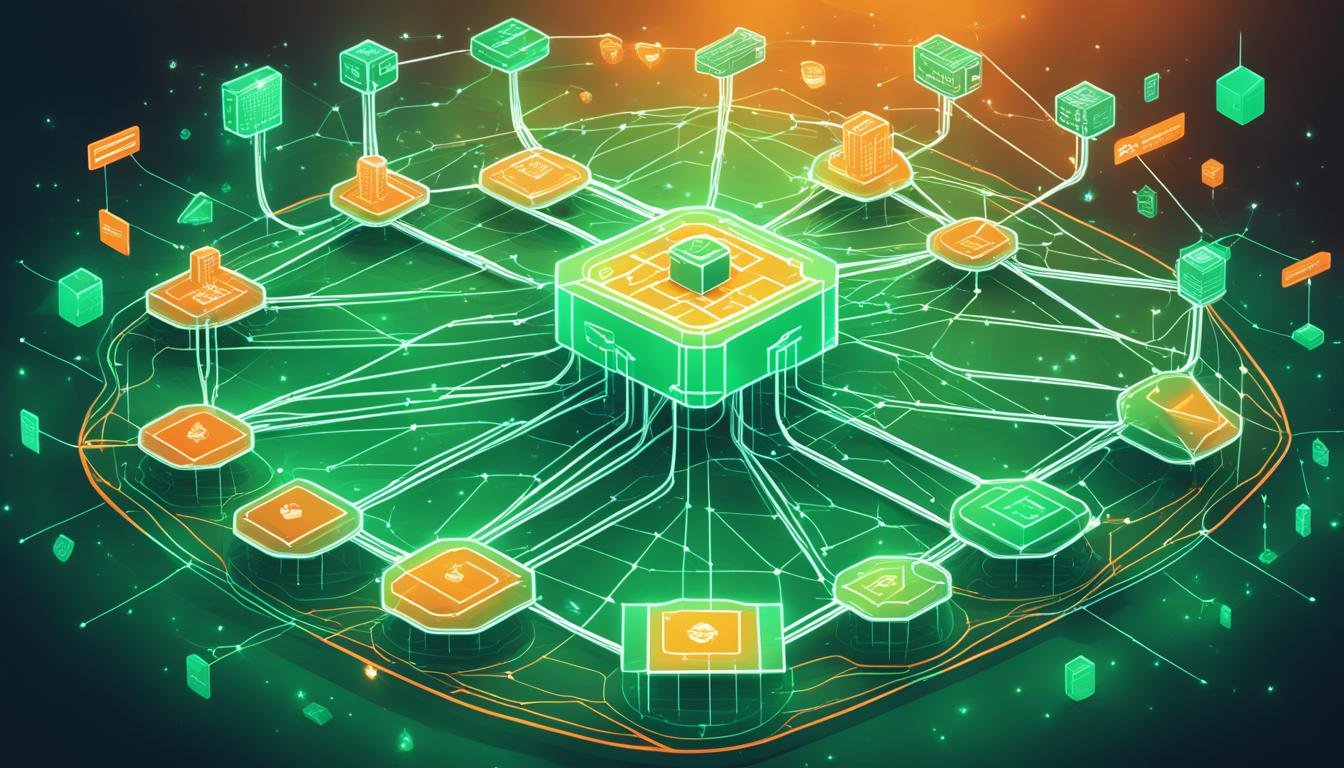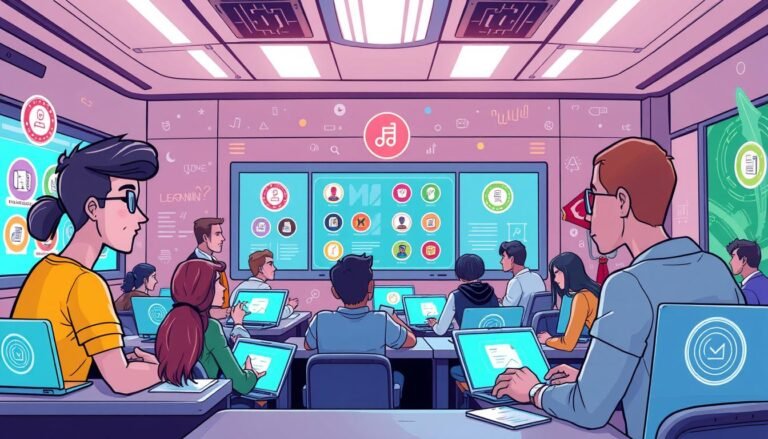Blockchain Technology: Transforming Industries in Ireland
Have you ever thought about how a digital ledger technology, famous for cryptocurrencies, could change industries in Ireland?
Ireland is now embracing new tech, and blockchain is leading this change. It’s known for its strong tech scene, making it perfect for blockchain’s impact. This tech is changing sectors like finance, healthcare, and supply chain management. It’s pushing Ireland towards more innovation and creating many tech jobs.
This change is also promising a bright future for blockchain in Ireland’s economy.
Key Takeaways
- Blockchain technology is becoming a key player in Ireland’s tech scene.
- Many industries in Ireland are using blockchain, from finance to healthcare.
- Ireland’s focus on innovation and R&D is helping blockchain grow.
- Blockchain’s decentralized nature offers better security and transparency.
- The growth of blockchain is opening up many job opportunities in Irish tech.
The Emergence of Blockchain in Ireland
Blockchain technology is making big waves in Ireland. It’s turning the country into a key spot for new ideas and business ventures. Startups and big companies are all eyeing the bright future of blockchain in Ireland.
Growth and Adoption
Blockchain Ireland has seen a surge in interest. Many startups and big companies are looking into its many uses. The global market is expected to hit $39.7 billion by 2025, growing at a fast pace. This growth is a big chance for Ireland to make a mark.
Government Support
The Irish government sees blockchain as a game-changer. They’ve launched the National Digital Strategy to help it grow. With Enterprise Ireland funding, many blockchain projects are getting a boost. This support is key to expanding the blockchain market in Ireland.
Financial Services Innovation in Ireland
The financial sector in Ireland has seen big changes thanks to blockchain technology. Irish fintech companies are using blockchain financial services for safer transactions and better transparency. Big banks and tech firms are testing blockchain to make sure transactions are quick and secure. This shows Ireland’s skill in using new financial solutions.
AIB’s Blockchain Experiments
Allied Irish Banks (AIB) is leading in tech innovation in finance. They’re trying out blockchain to make transactions safe and clear. Their work is about cutting down on fraud, speeding up transactions, and giving customers a secure way to bank.
With mobile banking up by 54% during COVID-19, AIB’s blockchain solutions are proving their worth. They’re showing how Irish financial services are adapting to new changes.
Circle’s International Money Transfers
Circle is a big name in Ireland’s fintech scene. They use blockchain to send money across borders quickly and cheaply. This shows the innovative side of Irish fintech and makes transactions safer and more transparent.
Circle’s use of blockchain in finance shows how companies are embracing this tech. It’s helping make global financial operations more efficient and secure.
Enhancing Supply Chain Transparency with Blockchain
Blockchain technology is now a key part of Irish Supply Chain Management. It brings Blockchain transparency and keeps records safe forever. This makes sure every step from making to delivering products is tracked well. It also cuts down on Fraud and builds trust with everyone involved.
Tracking Goods from Production to Delivery
Blockchain is changing how we track goods from start to finish. It lets us see every step in the Supply Chain Management system clearly. This is key for stopping fake goods and keeping things clean, especially in things like food and medicine.
OriginChain Networks
OriginChain Networks is a great example of this. It’s an Irish startup using blockchain for better tracking. They make sure products in areas like farming and medicine are real and safe. This stops fraud by catching any changes or lies, and makes tracking and checking products easy.
Using blockchain at OriginChain Networks shows how digital changes can solve big supply chain problems. It helps track how products move and checks if they’re real. This makes supply chains safer and more reliable.
Distributed Ledger Technology in Irish Healthcare
Ireland is using blockchain to change its healthcare for the better. It’s all about making data safer and keeping patient info private. The Health Service Executive (HSE) wants to make handling healthcare data and medical records better with this tech.
Data Security
Keeping patient data secure is a big deal in healthcare. Blockchain helps by spreading data out, so there’s no single point of failure. This way, data stays safe and trustworthy, locked in a secure network.
This approach not only keeps health info safe but also makes things run smoother. It cuts costs for hospitals and health services in Ireland.
Patient Privacy
Blockchain also means better privacy for patients. People can control who sees their health records. This is key in healthcare data management, where keeping patient info safe is a top priority.
Studies in Ireland are looking into how blockchain can change healthcare for the better. The tech could make things more efficient, help with rules, and make things safer. It’s looking like a big step forward for healthcare data in Ireland.
Smart Contracts and Real Estate Transactions
The real estate industry is changing fast with blockchain technology. Platforms like Property Bridges lead this change. They use smart contracts for cheaper real estate deals.
Property Bridges Platform
Property Bridges uses blockchain to make buying property clearer and faster. It cuts down on middlemen, making deals quicker and cheaper. This makes the process smoother and draws more people into secure property deals.
Efficiency and Cost Reduction
Smart contracts change the game in real estate. They make sure each step in a deal happens automatically when certain conditions are met. This cuts down on mistakes and speeds up deals.
Sweden was the first Western country to try blockchain for real estate in 2016. This move led to faster and cheaper real estate processes worldwide.
Blockchain gives high-quality data and makes processes clear and transparent. It cuts down on the time and cost of checking property titles. By avoiding manual checks, blockchain reduces mistakes and makes due diligence better.
Blockchain is a global trend in property deals. For example, a California start-up and Ukraine’s government teamed up to let foreign investors buy property online. The UK’s Cai-Capital is also looking into using Bitcoin and blockchain for payments in international markets.
In conclusion, blockchain is changing real estate for the better. It makes deals faster and cheaper, set to transform the industry.
Blockchain in Ireland’s Legal and Regulatory Framework
Blockchain technology is making big waves, and Ireland’s laws are changing to keep up. The Central Bank of Ireland is leading the way in making rules for Irish blockchain regulation. By 2024, the EU’s MiCA regulation will set clear rules, making things safer for investors.
EU’s MiCA Regulation
The MiCA regulation will change how digital assets are regulated in the EU, including Ireland. Gerry Cross, from the Central Bank of Ireland, says it’s important to follow these rules. Starting in June 2024, new rules will cover things like digital tokens and services.
Compliance and Legal Certainty
Following the rules is key for blockchain to grow and succeed. Right now, 11 companies are allowed to work with digital assets by the Central Bank of Ireland. Ripple joined them in December 2023. These companies have until December 29, 2025, to get more official approval.
Also, a new EU rule from January 1, 2026, will make sure companies share information and report on digital assets. This makes the rules stronger and safer for everyone.
These steps create a safe and innovative space for blockchain in Ireland. It helps the economy and keeps Irish people financially secure.
Cybersecurity Advantages of Blockchain
Blockchain technology is known for its strong cybersecurity features. It helps keep records safe and makes transactions secure. This is very important today because cyberattacks and data breaches are common. They cause big financial losses and harm a company’s reputation.
Tamper-Proof Records
Blockchain uses decentralized databases to keep records safe. Once data is on the blockchain, it can’t be changed or deleted. This ensures the data’s integrity. If someone tried to change the data, everyone on the network would know.
Enhanced Transactional Security
Blockchain also makes transactions more secure. It uses public key cryptography to make sure transactions are safe and verified. Because blockchain is decentralized, it can’t be taken down by one attack. This makes it a great way to keep transactions secure.
As more industries use blockchain, it’s important for companies to use strong cybersecurity measures. By using blockchain’s security features, companies can keep their data and transactions safe. This builds trust and security in their operations.
Opportunities and Challenges in IoT Integration
Blockchain IoT brings big chances for handling data in real-time across many industries. But, it also faces big hurdles. The main issue is the scalability of Blockchain IoT, which limits how many transactions it can handle. This creates big tech challenges that need solving.
Real-Time Data Processing
One big plus of Blockchain IoT is its ability to capture and process real-time data. This helps industries work better by making the most of resources and improving how things run. For example, in Dubai’s Jumeirah Lakes Towers, over 100 buildings, 1800 smart lights, and 370 smart bins collect more than 25,000 data points.
This data helps make better decisions, improving how resources are used and cutting down on waste.
Interoperability Issues
Even with its benefits, Blockchain IoT struggles with interoperability. Different blockchains use their own rules, making it hard to connect them smoothly. Fixing these issues is key for wider use and better handling of real-time data. Also, solving scalability problems is crucial for IoT networks to work well.
By 2030, the number of connected devices is expected to jump from 15 billion to 30 billion. This means Blockchain IoT will likely grow a lot. To keep up, we need strong solutions for scalability and interoperability to make IoT systems work well across different areas.
Blockchain Technology’s Impact on Irish Digital Identity Systems
Blockchain technology could change how Ireland handles digital identities for the better. Ireland is fifth in the EU for digital health and societal health, thanks to the Digital Economy and Society Index (DESI). But, it’s missing a people register, which hinders e-identity projects. Digital identity blockchain tech could fix this issue.
Blockchain makes digital identities more secure and private. This is good for people and blockchain-enabled business in Ireland. For example, MyGovID, linked to the Public Services Card, proves who you are online in Ireland. People really like it, showing it’s a success.
Ireland is sixth in public services and the most trusted in the OECD for government data use. Adding blockchain can make people trust their government more. Events like EthDublin and Blockchain Ireland help grow blockchain in Ireland and encourage new ideas.
Using blockchain in digital identities helps solve big social and environmental issues. It also protects consumers better. The Central Bank of Ireland can fight fraud with public blockchains. As Ireland uses more *blockchain-enabled business*, its digital identities will be safer, faster, and more reliable.
Blockchain Technology: Transforming Industries in Ireland
Blockchain startups in Ireland are booming thanks to support from groups like IDA Ireland and Enterprise Ireland. This support helps businesses use blockchain in many sectors. They’re also focusing on blockchain education to train a skilled workforce.
Both locals and internationals see big changes. For example, companies like AIB and Circle are making financial transactions safer and more open. In 2017, Irish beef exports went up 5% thanks to blockchain’s traceability.
The healthcare sector is also seeing changes. The Health Service Executive (HSE) is using blockchain for secure medical records. This could save up to 70% on admin costs and reduce data breaches by 55%.
Blockchain education is key to filling the skills gap. Schools and the community are working together to train people. This will keep Ireland ahead in blockchain technology.
Blockchain is changing many industries in Ireland. With help from companies, the government, and schools, Ireland is leading in tech.
Educational Initiatives and Talent Development
Blockchain technology is growing fast in Ireland, creating a big need for skilled workers. Irish universities blockchain courses are key in solving this problem. They help students and professionals get the skills they need for the changing job market.
Irish universities and Skillnet Ireland have created many blockchain courses. These programs aim to fill the talent gap blockchain by offering special training. Skillnet Ireland helps over 13,000 people every year with skills training to boost business and keep Ireland competitive.
Dublin City University started a Level 9 Masters in Blockchain program in 2018. It had its fifth group of students in 2023. Companies like PepsiCo Ireland are also training their staff for new technologies.
Working together with businesses is a big success factor. Skillnet Ireland teamed up with companies to give more training. This helped over 2,200 professionals in 2023. Thanks to these efforts, Irish universities are not just filling the talent gap blockchain. They’re also building a culture of ongoing learning and growth.
Conclusion
Blockchain technology is changing the game in Ireland. It makes things more secure, transparent, and efficient. This has opened up many new chances for growth.
The government is backing blockchain, making Ireland a key spot for tech. This is true for finance, healthcare, and more. Ireland is showing it can keep up with the future.
In healthcare, blockchain fights fraud and makes health records easier to manage. It lets patients control their own data. This improves how we share important info.
Blockchain also helps fight fake products in supply chains. It keeps quality high. A shared platform for healthcare workers means better updates and care.
This tech is key for keeping patient info safe and private. It lowers the risk of data breaches and builds trust.
Even though the world is moving fast with blockchain in food, Ireland is still catching up. There’s a big chance to use blockchain in food here. By studying and spreading the word, Ireland can catch up and lead in blockchain tech.
Working on education and training will make Ireland a top name in blockchain. This will help the country stay ahead in tech.
Source Links
- Blockchain Poised to Transform Ireland’s Healthcare Industry
- Innopharma Education Blog
- Blockchain Ireland Launched to Promote National Blockchain Innovation
- The Role of Blockchain in Ireland’s Tech Industry by Michéal Ó Maoldomhnaigh
- Fuelling Ireland’s Economic Growth Through the Opportunity of Crypto – Blockchain Ireland
- Understanding the Rapid Growth of Fintech in Ireland: A Look into the Future
- Technological innovation and financial regulation – a maturing relationship
- Fintech 2024 – Ireland | Global Practice Guides
- Unlocking the potential of blockchain technology in enhancing the fisheries supply chain: an exploration of critical adoption barriers in China – Scientific Reports
- Blockchain for Supply Chain Transparency in Irish Businesses – Biz Guru
- ICS participates in Irish bilateral of the EU Structured Dialogue
- A Blockchain-Based Smart Contract System for Healthcare Management
- Accenture invests in Dublin distributed ledger firm TradeIX
- Will blockchain technology transform real estate?
- Blockchain Transforms Real Estate Transactions to Digital – Wipro
- The Role of Regulation in Blockchain, Crypto and Web3 – Blockchain Ireland
- Digital Assets in 2024 – A Consideration of Some Legal, Regulatory and Market Trends | Irish Funds Industry Association | International Investments
- Cybersecurity for Blockchain-Based IoT Systems: A Review
- The Future of Cybersecurity Lies in Blockchain Technology
- A Survey on the Usage of Blockchain Technology for Cyber-Threats in the Context of Industry 4.0
- AI, Blockchain, and IoT Technologies are Shaping Businesses in the Middle East
- Integrating the IoT and Blockchain Technology for the Next Generation of Mining Inspection Systems
- Blockchain Opportunities and Challenges for Ireland – Blockchain Ireland
- How Web3 Technology Intersects with Irish Culture and Public Policy: Opportunities and Challenges.
- Upskill to thrive in dynamic environment of emerging technologies – Recruit Ireland.com
- 2023 – Celebrating 12 months of developing Ireland’s tech and ICT skills
- Blockchain Poised to Transform Ireland’s Healthcare Industry








